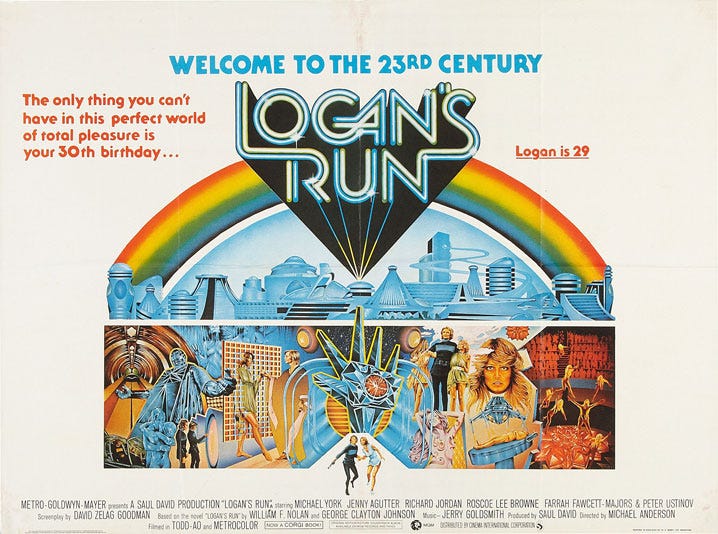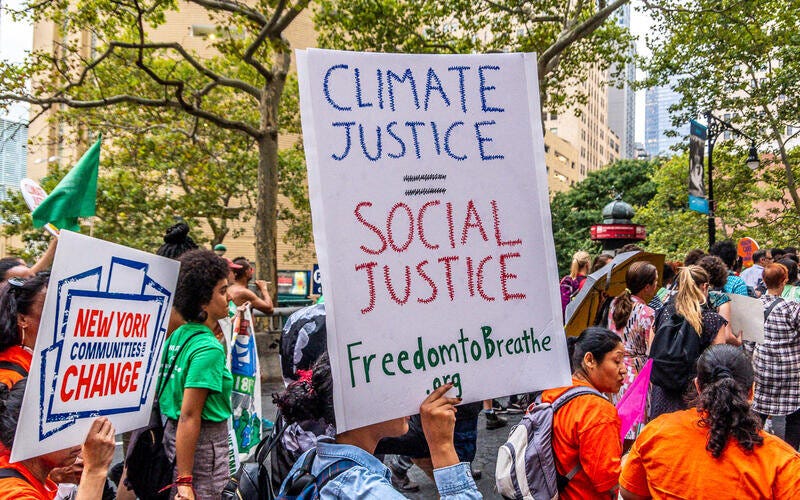12 February 2024. Boomers | Green economy
After the Boomers have gone // The case for green investment [#542]
Welcome to Just Two Things, which I try to publish three days a week. Some links may also appear on my blog from time to time. Links to the main articles are in cross-heads as well as the story. A reminder that if you don’t see Just Two Things in your inbox, it might have been routed to your spam filter. Comments are open.
1: After the Boomers have gone
The frailty of ageing leaders in all around us, whether in King Charles’ cancer diagnosis or the forgetfulness of the two elderly men whose names at the moment seem likely to be on the ballot in November to be the next President of the United States.
In Unherd, Mary Harrington puts this story, about the twilight of the Boomers, or “the Boomerdämmerung”, into an epic, even operatic, perspective:
In old Norse mythology “Ragnarok”, translated by the German composer Richard Wagner as Götterdammerung, or “Twilight of the Gods”, is a time of cruel weather, moral chaos, and monsters rising from all points of the compass... But there is hope. This fateful time, for ancient Germanic legend, is a period both of terrible destruction and also of renewal: the Götterdammerung may see Valhalla aflame, but in its aftermath the world will be rebuilt anew.
The Boomers, of course, were the “bulge” generation. There were a lot of them, born in the long aftermath of World War II, and brought up in a privileged world of high growth rates and rapidly improving standards of living:
the Boomers threw out the old sexual codes, dismissed pre-war European culture as stuffy and “square”, and scorned anything that smacked of nationalism, patriotism, or old high European culture as dangerously Hitlerish. In place of all that, they dreamed of new, sunlit Valhallas, freed from the dark gods of industrialised wartime destruction.
If there is an underlying worldview to all of this, she says, it is about “transformation, freedom, youth and the future.” The anthem for all of this—although Mary Harrington doesn’t mention the song—is probably The Who’s My Generation. I hope I die before I get old.
And Logan’s Run, the 1976 sci-fi film in which everyone dies ceremonially just before their 30th birthday, might be the archetypal cultural object. (It’s based on a 1967 story)
But it turns out that it didn’t quite work out like this:
In her 2021 book Boomers , Helen Andrews argues that in each case, this generation – from Steve Jobs to Camille Paglia and Aaron Sorkin – set out to liberate us, but “what they passed on to their children was worse than what they inherited”. Jobs sought to free our inner rebels, but created instead the stultifying world of social media; (Aaron Sorkin) turned social justice into a shakedown geared toward making well-off liberals feel good about their opinions; Paglia profited from an academic rigour whose abandonment she helped to legitimise.
And I can’t help thinking here that this isn’t the worst of the bunch, by some way. But generally, a generation that benefitted from free university education and affordable housing has managed to turn all of this into a Ponzi scheme.1
All the same, the Boomers are something of a Jekyll and Hyde generation, says Harrington. The Hyde part first:
Andrews can say, with some justice, that many boomers have not just failed to preserve and pass on the legacy they received to their own progeny, but actively consumed that cultural and economic seed-corn for their own selfish pleasure.
And you don’t have to dive very deep into notions of inter-generational fairness to watch this part of the Boomer legacy at work. On the other hand, there’s also the more public-spirited Jekyll part:
Much of the social fabric in my small town is held together by boomers. They show up to church. They donate their time to committees, volunteer for the council, make cakes for coffee mornings, and pick up litter. Small-town boomers are unfailingly polite, kind, generous, and public-spirited. In keeping with this spirit, boomers volunteer at much higher rates than younger generations.
It’s also possible that the first of these is a cohort effect—based on values—and the second is a lifestage effect—they’re working less and have more time on their hands.
Anyway, they’re now leaving the workforce quite quickly, although this is as much a function of ageing as the ‘’’diversity’ hiring practices” that get a sideswipe in the article. Unherd unfailingly wears its prejudices on its sleeve.
So the question is: what will it be like when they’re gone?
At this point, if I’m being honest, Harrington’s article falls apart a bit. It’s partly because she uses the phrase “Boomer Truth Regime” without bothering to define it. And if you do try to define it, you end up in a whole bunch of frankly conspiratorial places. It’s one of those phrases that creates an idea that’s impossible to argue about because it turns to blancmange the minute you touch it.
Columnists will column, of course, and one of the other problems of diving into a big idea about Götterdammerung is that the metaphor is too big for the idea that is being discussed.
So let me try to extract what seems to be her conclusion.
The Boomers scorned the prewar order of patriotism and tradition. They gave us a regime of unlimited self-expression, post-national governance, and individual freedom. And it was all mythologised via the narrative of Good vs Evil that grew up around the Second World War... One central pillar of that truth regime, for example, has always been a definition of the good relative to absolute evil as epitomised by Hitler and the Nazis, with the Holocaust as its central exhibit.
In a number of countries, of course, including the US, a significant proportion of young people are Holocaust-sceptics or -deniers, significant here being around one in five.
Harrington adds:
The same stark generational shift can be seen in the rising proportion of young people who support a strongman leader .
And so she concludes, more or less, that as the Boomers f-f-f-fade away,
Skills may be lost in generational transition, cultural reserves may be exhausted, carefully-accumulated inheritances may be frittered (literally) on cruises or (figuratively) on self-discovery and “modernisation”... But I suspect we’ll miss them bitterly: for though some aspects of boomerism undermined their own postwar settlement, boomers are also now the main force holding that settlement together.
As a Boomer myself who believes in progressive democratic values, I think my generation has generally been a disaster for the planet. SOIF, where I do most of my work, talks about the triple crises of climate change and biodiversity loss, wealth inequality, and loss of governance and trust. The fingerprints of the Boomers are all over all three of these.
The so-called “postwar settlement” was smashed up quite a long time, and Boomers were hard at work with the wrecking ball.
(Clayton Shonkwiler, ‘Gerontocracy’, 2015. Via flickr. CC BY-NC-ND 2.0)
We knew enough about climate change in the 1970s and 1980s to do something about it, but Boomer business leaders and politicians preferred to construct market-driven regimes that ate resources and increased inequality. And then turned round, surprised to discover that trust was collapsing.
The article that is linked to above on young people preferring a “strongman leader” blames young people and their parents for this2, rather than the failure of democratic systems to protect the futures of young people. I’ve had in my mind for some time a scenario where as the Boomer generation vanishes, political and cultural power skips at least a generation. I hope so. It couldn’t be worse than what we’ve got.
(H/t to Ian Christie for the link to the article).
2: The case for green investment
One of the guiding principles of Just Two Things is that I try not to dwell on local British politics unless there’s a bigger story to tell. That does seem to be the case, however, when it comes to the British Labour Party’s retreat from its plan to invest £28 million (€32 /$35 million) in a green transition if it wins the next election.
Labour looks all but certain to win—the Conservatives’ polling numbers are terrible at the moment, and getting worse—but just to make sure, it has chosen this moment to water down this significant climate change policy.
It’s not very good politics, as it happens (I’ll come back to that) but it’s not very good economics either. Jean McLean of the Green Economy Coalition has an article that tries to explain why.
Her starting point is that the post-carbon transition won’t happen by itself. It needs an industrial policy to make it happen. As it happens, there’s a very good example of how this works in practice in the United States, which you’d have thought might encourage the Atlanticists in the British Labour Party:
In the United States, the Inflation Reduction Act is the kind of green structural policymaking that delivers benefits for people and the planet. As described by the US Treasury Secretary, Janet Yellen, the IRA is designed to boost “economic growth by increasing labour supply, raising productivity, and reducing inequality and environmental damage.”
In the US, this is designed to create cheaper energy prices, prompt investment and innovation in clean technologies, and encourage sustainable businesses and sustainable innovation. New jobs and lower carbon emissions should result.
(Photo: Fred Murphy. CC BY-ND-NC 1.0)
In the UK green home insulation was also a target for the investment, and is desperately needed, although some of this seems to have been wrapped up in a separate ‘Warm Homes’ initiative, although the whole thing has been so badly communicated it’s hard to tell.
There is a number of reasons why government needs to be a market-setter. The first is about priming the pump where needed, sometimes in the area of skills programmes. Another is about putting skin into the game, so that business knows that it is committed to the policies it is espousing, and won’t flip-flop—which has plagued British green innovation of all kinds during the Conservatives’ years in office.
Because, when this is done well, it creates a much bigger economic impact. In the States, Goldman Sachs estimates that the Inflation Reduction Act will create $3 trillion of private sector investment in green technologies over the next decade. The so-called multiplier effect is real, and means that this kind of investment (as opposed to current spending) pays for itself in higher tax receipts over time.3
Creating an investment framework also makes it easier to shape markets through regulation and incentives. The failure to do this with heat pumps is one of the reasons why UK demand is so far behind Europe. And business both expects governments to do this, and wants them to. A recent open letter by businesses to the British Prime Minister pleaded for this:
We have consensus across the economy on the need for faster action, and the policy environment should reflect this consensus... Capitalising on these opportunities will generate growth and prosperity across the country. Polls show that British people support a green future... This is the economic opportunity of the 21st century and we are concerned that without a renewed focus and commitment to delivery from the Government, the UK will be left behind.
Because it’s not just about “opportunity”. It’s going to happen anyway. As McLean says:
(T)here will be a decarbonised economy, and electrification of everything from transportation to heating to agriculture is well underway. The only remaining question for policymakers is – do you want to be an early (adopter) to this new reality, or merely dragged along in the wake of those smart and ambitious enough to get out in front?
But public investment isn’t just about climate change. The British economy is crippled at the moment by a cycle of under-investment, low skills, and low productivity. In turn that means that governments are hamstrung by limited tax receipts, and in turn find it hard to spend money on re-building public services, which is also necessary if the economy is going to work better. This isn’t a cycle that the market will fix.
(Source: UNCTAD/ SDG Pulse)
The economist Simon Wren-Lewis wrote about this issue in his Mainly Macro blog last month. The British economy needs investment everywhere—on climate change mitigation, on the health service, in our bankrupt local authorities, in our (literally) collapsing school buildings. We need the public narrative to move from “obsessing about public debt to obsessing about public investment”. This investment is essential but not completely cost-free:
While higher public spending on day to day activities in such situations requires higher taxes, higher levels of investment paid for by borrowing will require interest rates to be higher than they otherwise would have been to free up resources for that investment. We can already see the battle lines of the next election reflecting this, with the Conservatives saying that Labour’s “reckless” (meaning very necessary and beneficial) additional green investment will push up mortgage rates.
There’s a particular issue here for progressive governments. They need to be able to demonstrate that things are getting better, for everyone, or they risk falling into a set of narratives driven by right-wing populists. Obviously Britain has no shortage of those at the moment, and a media culture, especially in its newspapers, that is happy to give them house-room.
The Green Economy Coalition article painted an attractive picture of the effects of that green investment that the Labour Party is walking back on:
Financially, consumers and communities will benefit from pioneering developments in strategic industries, future-proofed green jobs rooted in communities, cheaper home energy bills, and greater energy security. Cleaner air, better transport systems, and fewer climate deaths are just some of the potential health benefits.
Wren-Lewis argues that it is essential that this investment leads to these gains, and not just in affluent areas of the country:
It is therefore imperative that all parts of society begin to see the benefits from additional investment, particularly those areas that have been neglected in the past. This, in turn brings us an additional reason why public investment in the UK has to be much higher, and that is improving transport infrastructure outside London .
As it happens, voters seem to like the idea. The reason that we need to focus on investment and not debt is that progressive parties need to build consent for this. Because banging on all the time about taxes and “fiscal rules” is just echoing your opponents’ stories. And we know that one of the rules about political discourse is that you need to frame the argument by talking about your own metaphors, to make sure that it is happening on your ground. Whatever you do, “you don’t talk about the elephant”.
j2t#542
If you are enjoying Just Two Things, please do send it on to a friend or colleague.
I’m skipping past the bit where Harrington inserts the obligatory Unherd sneer at the academic values of the university system, which seems to be the classic conservative jibe at the notion of critical thinking coupled with the consequences of marketising the higher education sector :
the university system the boomers bequeathed us is a monolithically Left-wing and increasingly academically flaccid visa factory.
Too much time online, protective parents, limited social networks, too much work. Right.
Although current spending can also increase tax receipts as well. Affordable child care, for example.






